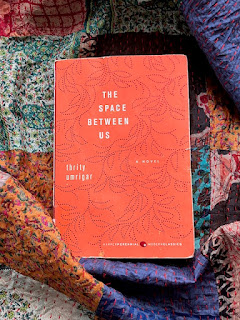The Space Between Us
Oh, this book, THE SPACE BETWEEN US, by THRITY UMRIGAR. It grabbed and squeezed my heart and triggered all kinds of memories. Bhima and Sera are two women in India, worlds apart in their status in life, one living in the slums, the other in a fancy, spacious upper-middle-class apartment. One an illiterate servant, the other her educated mistress. And yet, they find common ground as they work side by side. They are linked in their shared humanity and suffering, their servitude in their roles as women in a system that firmly divides classes, genders, and status in life. We are drawn into both worlds, the quiet dignity with which Bhima carries herself in her slum dwelling, and Sera’s world of wealth and power but also hopelessness and longing.
*
When I lived in Bahrain, every two years we visited Karachi
for two months during the school summer holidays. My parents were born and
raised there where we had many relatives, and the company my father worked for
in the Gulf, paid our fares (first by ship, then in later years by plane) back
to Pakistan every couple of years.
Life in Karachi was very different from what we were used to
in Bahrain. In our small three-room apartment in Karachi, we had servants who
came daily: the ayah to wash the dishes and sweep the floors, the other girl
who came to clean the bathroom, because even among the servants there was a
distinction of class, and the ayah would not deign to clean toilets. Then there
was the bistiwalla (sp?) who lugged a heavy water sack (was it made of some
kind of animal skin?) up five flights of stairs (no elevator) to fill our water
tank.
We had these servants because it was expected of us.
Everyone in Karachi did, no matter if you were middle-class and lived in a very
modest apartment. Labour was cheap and it provided jobs.
But it was not the norm for us, living in Bahrain, used to doing
our own domestic chores and water flowing constantly from our taps. I sensed my
parents’ discomfort with the stark display of poverty and division of classes. They
tried to mitigate this by slipping a few extra rupees to the servants, and food
to the ayah to take home to her family. My parents’ friends said they were
spoiling things for them, making it worse for them after we returned to Bahrain,
because then the servants would expect more. But we couldn’t shake the
discomfort we felt during those summers every couple of years.
Thrity Umrigar’s book brought all these memories flooding
back to me.
When we walked the route to church or our cousins’ house, we
passed by the slum where our ayah lived. There was a big gate that separated
the area where the servants lived in cramped poverty. Sometimes the gate was
open and I would glance in as we walked by, curious about the squalor that lay
beyond, where there were children like me but not like me. We were worlds
apart.
I was young and impressionable, but also blind to the realities
of the world that lay beyond the big gate. Perhaps this blindness shields us,
protects us, so that we don’t drown in the sorrows and struggles we see in the
lives of others. Because how can we witness it and not be moved by it, not feel
guilty about the comfort of our own lives, which we were born into out of sheer
luck.
But, unfairness and injustices, divisions of classes,
gender-based biases and the chasms between the haves and the have-nots do not
only exist in the India of Umrigar’s books. They exist in the west too. And the
world in her book can be found in our world too.



Comments
Post a Comment